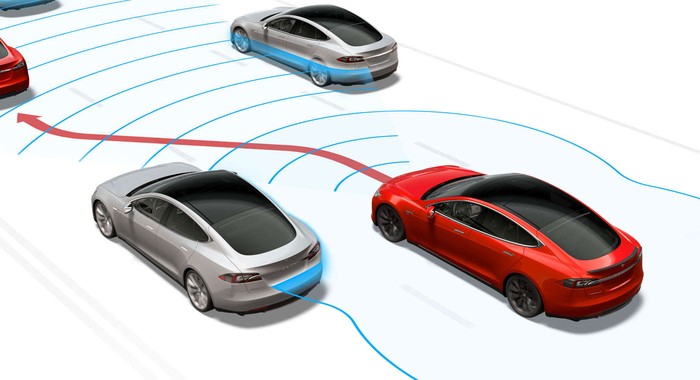
Tesla Autopilot 3.0 hardware 'order of magnitude' faster for AI
The company designed the v3.0 hardware to be drop-in compatible with cars originally equipped with v2.0 computers.
Tesla has shed more light on its upcoming Autopilot Hardware 3.0 upgrade, which promises an "order of magnitude" improvement in processing speed for artificial intelligence functions.
The company hired deep learning and computer vision expert Andrej Karpathy in 2017 to help reform the Autopilot development team. He is now working alongside former Apple chip designer Pete Bannon to develop a new AI-optimized Autopilot hardware suite from the ground up.
Speaking to investors for the company's Q2 conference call, CEO Elon Musk noted the v3.0 hardware is capable of running at a rate of 2,000 frames per second with overhead to spare. In comparison, the v2.0 system is only said to be capable of around 200 frames per second.
Autopilot 2.0 hardware is based on Nvidia's Drive PX 2 hardware, with custom Tesla software. The Autopilot v3.0 hardware is apparently powered by Tesla's own chips, developed in-house and optimized as a "neural network accelerator" for Tesla's own algorithms.
"Two years ago when I joined Tesla, we did a survey of all of the solutions that were out there for running neural networks, including GPUs; we went and talked to other people, like at ARM, that were building embedded solutions for running neural networks, and pretty much everywhere we looked, if someone had a hammer, whether it was a CPU or a GPU or whatever, they were adding something to accelerate neural networks," said Bannon on the Q2 call. "But nobody was doing a bottoms-up design from scratch. Which is what we elected to do. We have the benefit of having the insight into seeing what Tesla's neural networks looked like back then, and having projections of what they would look like into the future, and we were able to leverage all of that knowledge. And our willingness to totally commit to that style of computing has produced a design that's dramatically more efficient and has dramatically more performance than what you can buy today."
Notably, Nvidia's next-gen autonomous driving platform, known as Pegasus, is also claimed to offer 10X the performance of PX 2, but Musk's comments suggest Nvidia's most powerful hardware may not be immediately available to purchase for integration in production cars. Google is also using custom chips, known as 'tensor processing units' (TPUs), for neural-network processing in its datacenters.
The latest announcement confirms that existing cars will need to be retrofitted with v3.0 computers to enable higher-level autonomous functions. Engineers have been tasked with making the new computer drop-in compatible with current cars, apparently requiring no modifications to wiring harnesses or sensor systems.
"We take out one computer, plug in the next," Musk said.
The Hardware 3.0 system is expected to be ready sometime next year, with drop-in replacements available for the Model S, X and 3. The system is claimed to be the "world's most advanced computer for autonomous driving."
Musk says the company is planning to further expand its chip design team and increase investment in Autopilot hardware development going forward.